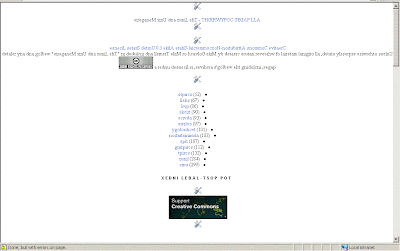Hey again,
You may recall, just a few days ago (I think...), we put out a script do language translation using Yahoo/AltaVista's Babelfish interface. I mentioned, briefly, in that post that, when translating something into a foreign language, I always like to do a "reverse translation" using the translated output from my original query, and see how close the back-translation comes to what I originally wrote. It can make for hilarious results. In fact, unless you're entering something like "hello," it's almost guaranteed to come back goofy when translated back to English (or your native language).
For instance, given a phrase, and randomly picking Italian for the language to translate to-and-from, we would get this:
Original Phrase: Can I get you a drink, officer?
Translated to from English to Italian: Posso ottenergli una bevanda, ufficiale?
Translated back to English: I can ottenergli a drink, official?
What??? Apparently, The Italian "ottenergli" has no literal or idiomatic translation in English. And, if the back translation proves anything, it's that direct translation between languages is fairly weak. The translator (preferably a human ;) needs to be able to translate idiomatic phrases and cultural nuances and adapt them accordingly.
The good news is that this can be even more hilarious for you :) At the Lost In Translation language-bouncing site, it'll put anything you want through multiple language filters and give you back something that more closely resembles gibberish than your original expression.
Even "Hello" is not immune!!! Here is the output (only the final output, although, on the Lost In Translation page it takes you through each step in the translation/back-translation process so you get a play by play on how your original meaning is mashed up and beaten into a sticky pulp of utter nonsense ;)
English Text Entered: Hello
After Final Back-Translation: Today
This makes no sense to me whatsoever (since I don't have a thorough understanding of all of the languages the site uses to "babelize" your original word or sentence). But it does make for some interesting reading. I've found, also, that if you choose not to include "Chinese, Japanese and Korean," your phrase has a better chance at surviving. For instance, "hello there," without the CJK, comes back as "hello there." With CJK, it seems to come back as either "highly there" or "today here" ;)
I, personally, find it very interesting to put my company's catch-phrase in. Any advertising slogan is generally good fodder, as well :)
I've tried to inline the initial "textarea" box here (you will be taken off of blogspot to tashian.com to get your results). If it doesn't work in your browser, you can get to the original Babel page here.
Cheers,
, Mike
Please note that this blog accepts comments via email only. See our Mission And Policy Statement for further details.


















